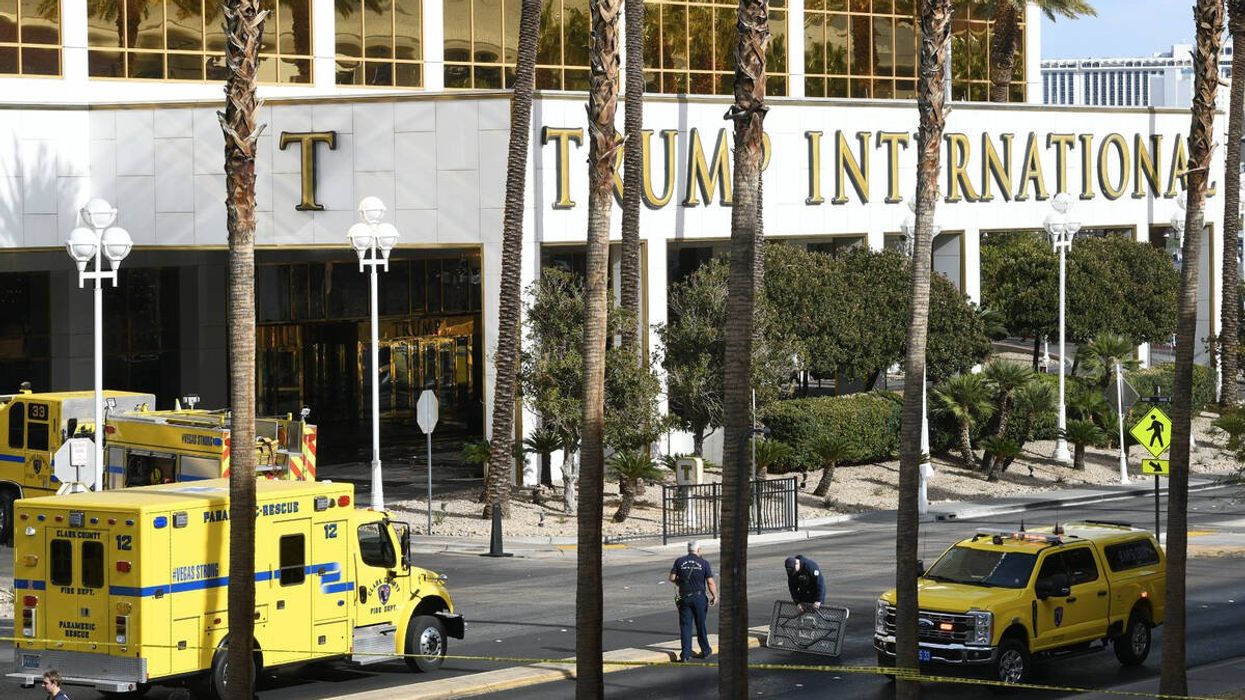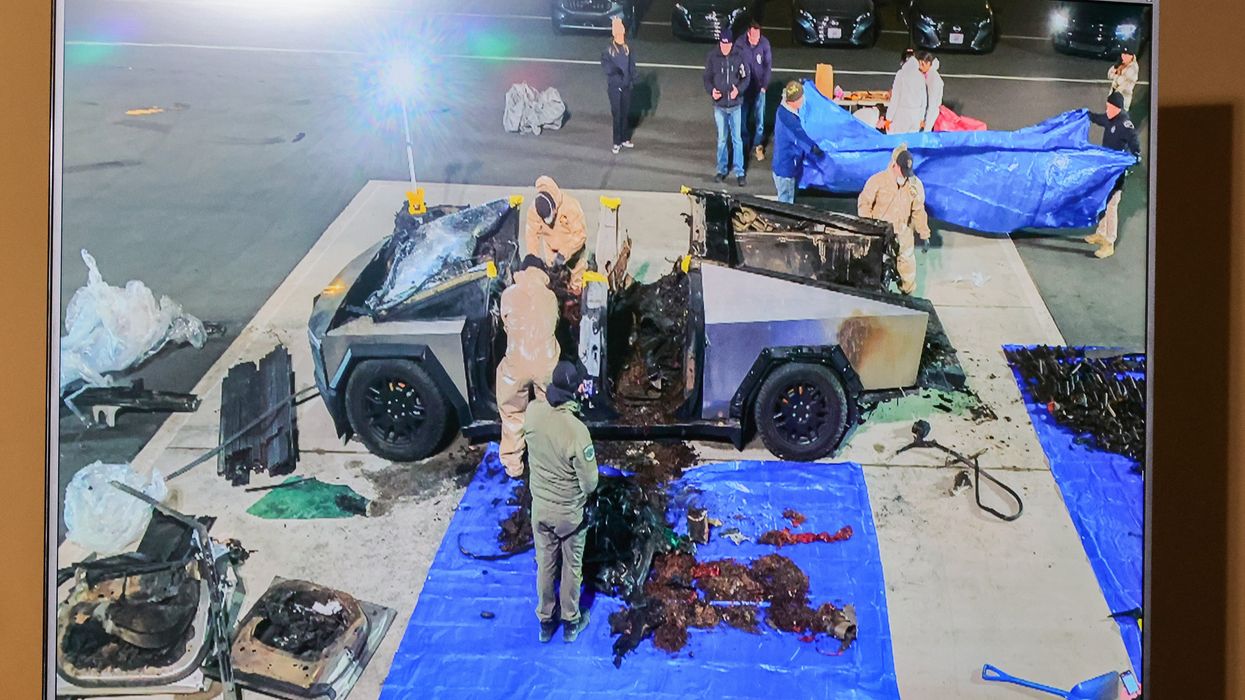Despite being shut out of most movie theaters across the country, ‘The Interview’ starring Seth Rogen still managed to make $15 million via online downloads. Not a terrible number considering the likely high number of illegal downloads - but how was the movie itself? Buck Sexton (filling in for Glenn) saw it and gave his review on radio today.
Below is a transcript of this segment:
Buck Sexton: So I saw "The Interview" over the weekend. I watched it. Yes, yes, I did. And before I talk about standing in solidarity with the First Amendment and free expression, let he talk to you about this movie. For those of who you have not yet seen it.
By the way, my understanding is it made $15 million from downloads. Was illegally seen, downloaded many times before that. Or many times in addition to that at least. And made a few million dollars in the theaters from which it was shown.
So let me just say. As much as it seems like free speech has won the day, and in a sense it has. By the way, when this initially broke, I was on Fox and I said, listen, this is about what the American people's response is. It shouldn't just all be dumping on Sony. They'll release in it a different format. I understand that they're licking their wounds right now and the American people will watch it and that's up to us to do. And to show that we won't let some dictator -- people keep referring to him as a Pol Pot dictator. I'm like he does have nuclear weapons, but we'll get to that in a minute. We won't let him tell us what we can read, watch, any of that.
So as for the movie itself, and for the purposes of full disclosure, I'm not a particularly big James Franco slash -- as Obama has dubbed him now, James Flacco fan. For am I up two widely celebrate the theatrical works of Seth Rogen, I give this movie a C, maybe. Maybe a C-plus. There's really nothing particularly clever in it. It seems makes the "Police Academy" movies look like masterpiece theaters. I kind of miss the "Police Academy" movies. It is Pauly Shore bad.
And for those of who your like me, children of the '90s to some degree or whatever, had our formative years in the '90s, I remember going into seeing Pauly Shore films, you will recall just what an atrocity they were. And in certain parts it feels like a Pauly Shore movie.
James Franco plays a guy named Skylark. They go to interview Kim Jong Un in North Korea. There's a lot of idiot stoner humor. They take every opportunity they can to sort of work in a stereotypical Asian accent and of course James Franco, as soon as he arrives in North Korea, turns around to everyone and says (speaking foreign language) -- infusing Japanese with Korean intentionally. Now, look -- it's not intentional for the character but this passes for about as clever as the movie actually gets.
Just sharing my general thoughts on this before we get into the fact that there is a war on free speech around the world. A continuing war. It is a continuous struggle and it's a serious one and it's one I want to spend some time talking to you about today. But before we get into that, I just thought it was worthwhile to discuss "The Interview" a little bit. This movie that's gotten so much buzz because it essentially kicked off at least a battle in a broader cyber war.
Those of you that don't like potty, potty humor, and sort of "American Pie" style, very sexual humor, you will not like this movie.
But you could if you wanted to, it's just an act of defiance, you could just download this. You could download this to show that we will not allow our taste in film and art to be dictate by some guy.
This reminds me of the line from Jack Donaghy's mother in the show "30 Rock." Jack Donaghy is the best part of the show. It's the conservative and he's played by Alec Baldwin and I have to separate out the person from the character. It's a good character. But his mother says if she always travels on Pearl Harbor Day because she wants to show the emperor she's not afraid. This is like in 2008.
Nonetheless, there's a lot of really sort of low brow stuff in 'The Interview; movie. They work in a bunch of 'Lord Of The Rings' references. You get the feeling that they wrote the script, and Rogen and Franco were both paid $7 million apiece for this film and there was some additional money for Rogen directing and I guess this was directed by somebody. They could have spent more money on writers, I would think. This might have been a better idea. And you get the sense that this was written in between bong binges and attempts to outdo one another and how fast one could vacuum a bag of Fritos clean.
But the best part of the movie is actually a King Charles puppy that shows up at one point, because King Charles puppies are adorable. So there's a King Charles puppy and it plays a prominent role towards the end. There is an attractive C.I.A. agent. That's okay, I guess. Trying to think of the other good things. It doesn't actually make fun of Kim Jong Un that much. It makes him pretty likable for most of the film. At the very end, it sort of turns on him. And the time scene, by the way, there's some bloody and disgusting stuff in the movie. But the final scene is not that -- I mean, by American cinema standards now, what we see with these movies where people have, you know, oh, gosh, all this movies with the saws and the -- all the blades and the people being chained up every where and everything. This 'Saw' franchise and all this stuff. It was tame is what I'm trying to say. The ending was tame.
And I think that there was -- it was much ado about nothing. I guess what I'm trying to tell you. That North Korea had such an objection to this.
'Team America,' which is a classic of American cinema, had -- there's no question 'Team America,' it's a better movie. But also was much more humiliating for the regime. You've got Kim Jong Il as a puppet and he's singing the song that he's so lonely and that's now how he pronounces it and in the end he's actually a roach. That went without incidence. So you get this sense, this must be in some way a result of the fact that North Korea, with Chinese assistance, whether overt or covert or whatever, has a capability to do what it did to Sony but it didn't then because 'Team America' lights up the regime.
I'll be honest with you, it did not really go after North Korea that much. Now, I'm not saying that it was trying to, but just given the outrage that came -- well, I shouldn't say outrage. It came from one place and is one place only, which is the Democrat People's Republic of North Korea, which they don't see the humor in the name but all the rest of us do, right? As has been said before by me on this show and elsewhere, Christopher Hitchens best described it as a concentration camp above ground and a mass grave below it -- that this country or this regime would take it upon itself to try to determine for us what movies we can see just seems so crazy. But that the move that they get so upset about was 'The Interview.'
I got to tell you, it was a bad movie. And I'm okay with funny bad. You know, you don't have to be brilliant, clever, funny like best in "Show," for example, which any of you who haven't seen it cannot recommend it for highly. We are being to move from movies to the war on free speech because I'm not one of those shows -- Siskel and Ebert turned into. But this movie did not even really go after the regime very much at all and it was sophomoric in the worst ways and I'm amazed that Sony would spend $50 million on this piece of garbage, quite honestly. And I wish that given all of the hubbub around this, given all the gnashing of teeth -- I guess it's covert, right? They still pretend that it wasn't them but given what happened but -- that was apparently a decent movie. I didn't see it, Guardians of Peace, yes. The GOP. And they don't see the irony of that of course either, I suppose. But given that that's what's going on here, I just wish it was better. I wish it had really rolled up the sleeves and gone after the regime, you know, in the old Irish way. You know, just really gone after it. Right on the chin. But no. No. It really didn't.
It was really just more of a -- sort of stoner bromance for Rogen and Franco. But that's it. And we've had the whole country into hacking and it brought down Sony studios for a move that I got to tell you, I think it would have absolutely bombed without the hacking threat and everything else. I don't think this would have done well at all. I don't think anybody would have cared, I don't think anybody would have seen it. So in a sense, I don't know.
We'll see how this all shakes out for Sony at the end.
Front page image courtesy of the AP.




